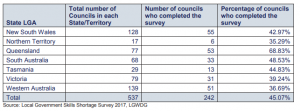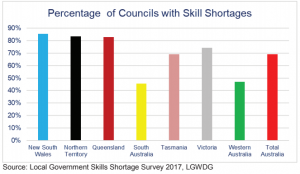Local government professionals across Australia are facing a major skills shortage across key occupations, and are “not well positioned” in new and emerging soft skills, according to a forthcoming national review of the local government workforce seen by Government News.
The national survey of Australia’s 189,500 council workers, which is due to be published in February, found that almost 70 per cent of councils are grappling with a shortage of key occupations.
The review, commissioned by the Local Government Workforce Development Group (LGWDG) for the Australian Local Government Association (ALGA), is based on ABS data and a skills shortage survey completed last year by 45 per cent of Australian councils.
It is understood that the review is the first data set of its kind, and was undertaken to establish a clear picture of the current and future workforce needs of local government.
Government News understands that ALGA will put the report’s recommendations to the board in February, at which point a formal policy stance will be developed.

Report: “Critical” skills shortage
Just under 70 per cent of councils reported a shortage of key occupations, with engineers and town planners, building surveyors, environmental health officers and project managers topping the list of most in-demand occupations.
Almost half also noted a significant shortage of apprentices, with 44 per cent indicating they didn’t have enough apprentices to meet their future skill needs, and almost a third saying that the skills shortage would be a “critical issue” in the future.

Australian councils were also found to be experiencing a substantial skills gap, with 59 per cent of local governments saying that there was a gap between skills of employee and skills needed to perform their job.
All council workers surveyed also reported the need to improve their soft skills, particularly digital skills and the ability to work productively and drive engagement and presence as a member of a virtual team.
Many councils noted being ill-equipped for future digital demands, with 70 per cent of councils having done no forecasting of changing skill requirements arising from digital disruption.
Major challenges in closing gap
A lack of qualified individuals locally, the remoteness of some councils and inability of councils to compete with the private sector were among the forces driving the skills shortage.
Although the nation’s 189,500 council workers all expressed the need to upskill, the report found considerable barriers to this, including the inability to source trainers locally, travel costs, fiscal constraints and mounting workloads.

Staff training was also found to be lacking with almost one third of councils reported having unmet training needs as a result of the high cost of training and lack of availability. Similar factors were found to be hindering the acquisition of soft skills by council employees.
Councils to lobby Federal Government
The report has called on the national local government peak to lobby the federal government to reform VET funding to ensure it supports training for high-demand occupations in local government and to develop a digital strategy to upskill council workers.
Local government associations would also engage with training organisations to ensure the needs of the sector are met through the design of qualifications and skills under the report’s recommendations.
The review has also called on ALGA to supply information on skill shortage occupations to the Department of Home Affairs annually for inclusion in the list of eligible skilled occupations.
Under the recommendations, the peak would also commission research on behalf of the sector identifying the impact of technology and other drivers of change on current jobs and emerging skill needs.
The report has also called for the national peak to work with state council associations to develop a data set with key workforce demographics.
The working group has also recommended a group of local government associations be sponsored by ALGA to recruit overseas within the top five skill shortage occupations.
ALGA was contacted for comment, but told Government News they would issue a statement when the report is publicly released.
Comment below to have your say on this story.
If you have a news story or tip-off, get in touch at editorial@governmentnews.com.au.
Sign up to the Government News newsletter.




Thanks for this article.
It’s worth noting that the skills gap/ shortages outlined above refer largely to those within a ‘business as usual’ scenario. The simple fact of the matter is that the BAU which distinguishes between levels of government, between private, civil and public sector delivery responsibilities, is based on traditional funding streams, and maintains a distinction across disciplinary territories, is struggling to adequately respond to making and managing contemporary cities and communities. Urbanization (and by that I also include settlements in rural contexts that support agri-economies) is increasing. We’ve been told this for the past two decades. This means that increasingly urban communities are frontline in the management/ mitigation of global challenges. Many of these require systemic approaches that are well beyond the transactional services-based businesses which characterising much of local government today. While traditional disciplines remain broadly relevant, urgent attention needs to be given to the new skills required to apply new bodies of knowledge, to build new governance and executive structures, and facilitate new approaches to devolved mutli-partnered implementation.
Ingo,
Specifically this statement, “…transactional services-based businesses which characterising much of local government today”. This is precisely what is slowing down the push for innovation in government. We want innovation but it is extraordinarily difficult to extract oneself from the transactional business model frame of reference.
Local Government Professionals Australia in each state/ territory provides the professional leadership and management training required to help deliver the professional needs of staff into the future. The wider issue is that soft skills training is not subsidised by any level of government – only hard skills are which actually signals that soft skills are not important in Australia – which is wrong. Both are important as outlined in the article. In NSW, LG Professionals Australia NSW has identified this area to correct this imbalance and as outlined in comments already made here, there are so many other areas that are critical for staff be be capable of in a modern workplace; navigating change, customer needs, new technology, integration, calibration and optimisation of business effort in support of enhanced community outcomes. LG Professionals Australia is dedicated to this task collectively and in each state. All work they each do goes back to enabling the associations to support the sector and not into ‘for-profits’ hands.
Councils continually employ people who do not have the skills, qualifications or experience at senior levels. Position descriptions noting clearly determined qualifications, skills and experience requirements should be mandatory. Expensive time and budget losses are inherent and in Queensland at least … High wages, benefits and conditions (LG managers on federal income base including super etc) is a wrought unless the individual meets a target based outcome and is assessed annually.
The solution is surely multi-pronged. Yes the Councils have a skills shortage due to a lack of capacity to compete with the private sector, but in NSW at least, this is partly due to Councils being asked to do more with limited income in an increasingly complex regulatory environment. I suspect that this shortage could be largely addressed through regulatory and process reform….but change is hard and will need to be driven by the State Govt.